
|
Astronomy Picture Of the Day (APOD)
 Lunar Prospects
Lunar Prospects
18.09.1998
Launched on January 6th, NASA's Lunar Prospector spacecraft has been exploring the Moon with instruments designed to sense global properties while orbiting pole-to-pole, 63 miles above the lunar surface. Now over half...
 Radio, The Big Ear, And The Wow! Signal
Radio, The Big Ear, And The Wow! Signal
17.09.1998
Since the early days of radio and television we have been freely broadcasting signals into space. For some time now, we have been listening too. Ohio State University's radio telescope, affectionately known as "The Big Ear" , was one of the first and largest listeners.
 Jupiters Rings Revealed
Jupiters Rings Revealed
16.09.1998
Why does Jupiter have rings? Jupiter's rings were discovered in 1979 by the passing Voyager 1 spacecraft, but their origin has always been a mystery. Recent data from the Galileo spacecraft currently orbiting Jupiter now confirms that these rings were created by meteoroid impacts on small nearby moons.
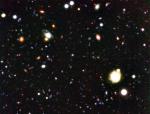 The NTT SUSI Deep Field
The NTT SUSI Deep Field
15.09.1998
What happens if you point a large telescope at nothing? The above New Technology Telescope SUSI Deep Field photograph isolated a small patch of sky picked to contain no bright objects at all.
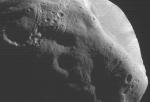 Dust Hip Deep on Phobos
Dust Hip Deep on Phobos
14.09.1998
Landing on the Martian Moon Phobos might be harder than previously thought. The reason: Moon dust. Recent photographs of Phobos have indicated that a layer of fine powder estimated to be a meter deep covers the whole surface. Evidence comes from infrared pictures that indicate the rapid speed that Phobos' surface cools after sunset.
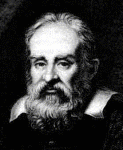 Galileo Demonstrates the Telescope
Galileo Demonstrates the Telescope
13.09.1998
Galileo Galilei made a good discovery great. Upon hearing at age 40 that a Dutch optician had invented a glass that made distant objects appear larger, Galileo crafted his own telescope and turned it toward the sky.
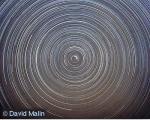 Star Trails in Northern Skies
Star Trails in Northern Skies
12.09.1998
As the Earth spins on its axis, the sky seems to rotate around us. This motion produces the beautiful concentric trails traced by the stars in this time exposure of the night sky.
 Help Map The Moon
Help Map The Moon
11.09.1998
You can help map the Moon. Early tomorrow morning (Saturday, September 12) the Moon will occult, or pass in front of, the bright star Aldebaran as viewed from some Southern and Eastern areas of the U.S. as well as regions in the Caribbean Sea, Nova Scotia, Newfoundland, Mexico, and Central America.
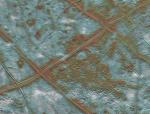 Europa: Ridges and Rafts on a Frozen Moon
Europa: Ridges and Rafts on a Frozen Moon
10.09.1998
The large Jovian moon Europa may harbor liquid water beneath its frozen crust. Controversy surrounding this idea has been recently fueled by dramatic images of Europa's surface from the Galileo spacecraft. This alluring...
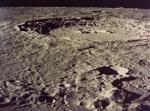 Crater Copernicus
Crater Copernicus
9.09.1998
One of the more prominent craters on the Moon is named Copernicus. Copernicus is a large young crater visible with binoculars slightly northwest of the center of the Moon's Earth-facing hemisphere. Copernicus is distinguished by its size and by the many bright rays pointing out from it.
|
January February March April May June July August September October November December |
|||||||||||||||||||||||||||||||||||||||||||||||||